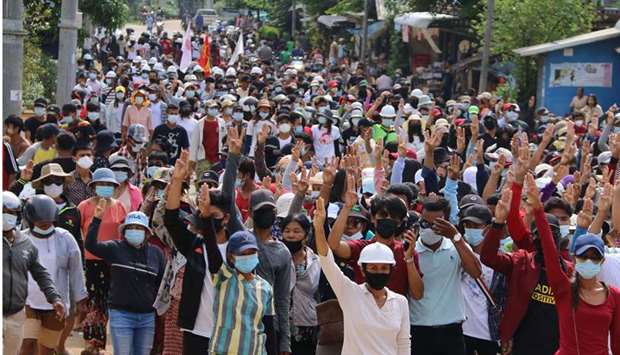Opponents of Myanmar's junta announced a National Unity Government on Friday including ousted members of parliament and leaders of anti-coup protests and ethnic minorities, saying their aim was to root out military rule.
Myanmar has been in violent turmoil since a Feb. 1 coup that ousted a civilian government led by democracy champion Aung San Suu Kyi, which had held power for five years and was starting its second term after a landslide election victory in November.
People have been taking to the streets day after day to demand the restoration of democracy, defying crackdowns by the security forces in which more than 700 people have been killed, according to a monitoring group.
At the same time, political leaders, including ousted members of parliament from Suu Kyi's party, have been trying to organise to show the country and the outside world that they and not the generals are the legitimate political authority.
‘Please welcome the people's government,’ veteran democracy activist Min Ko Naing said in a 10-minute video address announcing the formation of the National Unity Government.
While setting out few positions, Min Ko Naing said the will of the people was the unity government's priority, while acknowledging the scale of the task at hand.
‘We're trying to get this out from the roots so we have to sacrifice a lot,’ he said, referring to the junta.
One of the unity's government's primary objectives will be to win international support and recognition.
The generals justified their take-over by accusing Suu Kyi's party, the National League for Democracy (NLD), of voter fraud in the November election, though the election commission dismissed their objections.
The military's bloody suppression of the protests has shocked and angered much of the world. International pressure has also been slowly building, particularly from Western governments, though the military has a long record of brushing off what it sees as outside interference.
The unity government released a list of office holders including members of ethnic minorities and protest leaders, underlining the unity of purpose between the pro-democracy movement and autonomy-seeking minority communities, some of whom have battled the central government for decades.
A spokesman for the junta could not be reached for comment.
The unity government's minister of international cooperation, Dr Sasa, who goes by one name, told Reuters in an interview the objective was to end violence, restore democracy and build a ‘federal democratic union’.
‘A new day has come for our people, a new era for Myanmar has started,’ he said.
FEDERAL ARMY
While the politicians were announcing the unity government, other opponents of military rule observed a ‘silent strike’ staying home to mourn those killed or wearing black in small marches in several cities and towns.
‘The most silent voice is the loudest,’ protest leader Ei Thinzar Maung posted on her Facebook page.
Streets in the main city of Yangon were largely deserted, residents said, while black-clad protesters held small rallies in half a dozen cities and towns, media reported.
There were no immediate reports of violence but overnight, two people were shot and killed in the central town of Myingyan, Radio Free Asia reported.
The military has also been rounding up its critics and has published the names of more than 200 people wanted under a law that makes it illegal to encourage mutiny or dereliction of duty in the armed forces.
Two prominent protest organisers were arrested on Thursday along with an actor and singer, both known for speaking out against the coup.
In another show of defiance, a previously unknown group called the Ayeyarwaddy Federal Army said on Facebook it aimed to fight the military to restore an elected government and protect the people and it called for volunteers.
It gave no details about how it aimed to take on the well-equipped and experienced army.
The turmoil has alarmed Myanmar's neighbours in Southeast Asia, who have been trying to encourage talks between the rival sides.
Southeast Asian leaders will meet in Indonesia on April 24 to discuss the situation, Thai and Indonesian media reported.
Junta leader Senior General Min Aung Hlaing was due to attend, a Thai broadcaster said, but the Jakarta Post said it had not been confirmed whether the summit would include representatives of the junta or the former government.
Sasa says ASEAN should not invite ‘murderer-in-chief’ Min Aung Hlaing to the summit.
The European Union has agreed to impose sanctions on another 10 individuals linked to the coup and to target two businesses run by the armed forces for the first time in protest at the military takeover, two diplomats said.

